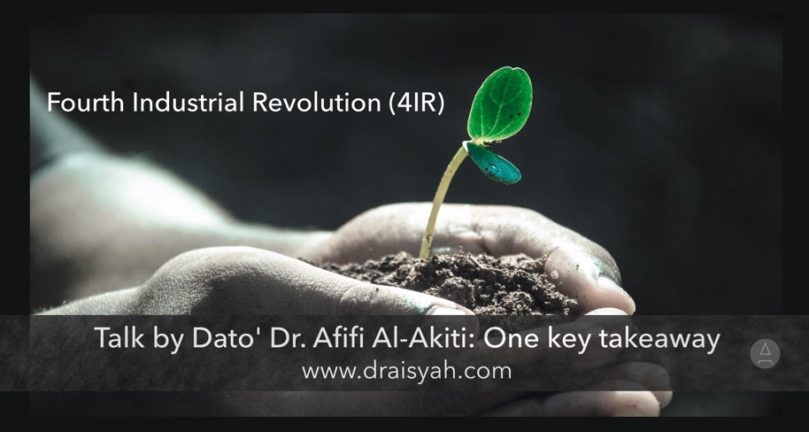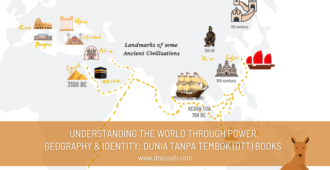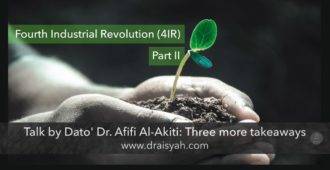I’ve always wanted to listen to Dato’ Dr. Afifi‘s presentation. First and foremost, he is a Malaysian, who serves as a KFAS Fellow in Islamic Studies and a Islamic Centre Lecturer at Faculty of Theology and Religion at University of Oxford. Recently, he delivered a seminar regarding Islamic Studies in the Fourth Industrial Revolution (4IR) at Universiti Kebangsaan Malaysia (UKM).
In this blog post, I share one important takeaway from Dato’ Dr. Afifi’s talk. Even though the title of the talk was on Islamic studies, his core message has a universal appeal. It’s applicable to anyone, whether you’re a Muslim, Christian, Buddhist, Hindu or an atheist – as we are moving into the 4IR period.
Since it’s quite related to my earlier blog post on the changing role of pharmacists in the 4IR, I was quite curious and interested to hear Dato’ Dr. Afifi’s views and perspectives on this matter. Particularly, how Islamic Studies can be of relevance in 4IR, or rather… vice versa?
Learning via social media
I wish I could sneak into Dato’ Dr. Afifi’s seminars and listen to him live. But in this case, I felt quite lucky to catch his talk on @UKMOfficial FB page. When I saw the post on my FB, I was driving and running errands around town. Thanks to the fast-internet connection on my mobile, I listened to his talk in my car bluetooth speakers. Yes, I shouldn’t multi-task while driving… This is one of few talks that I actually stopped, parked my car and sat down to watch the recorded seminar on FB.
His talk was inspiring. It provides another view point that I hadn’t considered before. It’s about making lives easier. More convenient in the IRs. So how can you be a part of the 4IR? Read on the second post, 3 more takeaways. I’m writing a second post on this – watch this space.
My initial thoughts were captured as follows in an FB post:
Pengajian Islam in the 4th Industrial Revolution. Engaging speaker, Dato Dr Afifi Al-Akiti. Read around your subject, he recommends. Watch from minute 54…
And always strive for:
The Prophet Muhammad SAW said “The most beloved people to Allah are those who are most beneficial to the people…”
reported by Ibn Umar (Ref.: Daily Hadith Online).
Translation: “… Orang yang paling disayangi antara manusia di sisi Allah adalah yang paling bermanfaat bagi manusia…”
The key takeaway: Be of service to others
It’s not easy to continually be of benefit to people or a community, yet come off without the feelings of being used by the other person. Professionals such as doctors, nurses and teachers are more likely to experience stress and burnouts than other professions. This is, I think, where the knowledge of Self and own boundaries is important. This is when you need to see if 1+1 leads to 3, not just 2 or 0.5.
When health is the real wealth.
In today’s world of KPIs and ROIs, many prefer to work in ways that bring benefits to themselves.
- “Let’s collaborate, have a workshop together. Can you email me the topics and details you will cover?” a lecturer asks. Email sent. No news.
- “Do you have a minute? Can you take a look at this presentation?” asks a colleague. Two hours later…
- “Where are you??? I need your expert advices, what are the differences between A and B?”… Why you want to know? “So that I look good in front of my colleagues.” Facepalm.
- “How can I make use of you?” one thinks out loud. We can work together but please don’t use me…
- “Don’t worry, I just want to use it (your data) for my reference,” assures another. Err… now I worry.
- “How did you do the experiment? Can you please show my students how you did it? I’ll put your name as co-supervisor” a lecturer pleads. Eons later, still no news.
- “What are your thoughts on this matter?” i.e. I don’t have any new ideas, I need yours! It’d be very embarrassing to admit it since people think I’m the top expert in the country.
Plenty of takes. Or fakes. Fewer genuinely give.
When I came home from a sabbatical in Australia, I reflected upon the ways things got done in the universities in Malaysia and Australia (and in the UK). And I realised that collaboration and/or cooperation happen organically. To suit a context or address a real problem.
Faking, forcing or manipulating something to fit a local issue often lead to short-term gains.
Be your own CEO
This hadith also reminds me of the work and sacrifices by Prof. Yunus, Mother Theresa, Gandhi and Nelson Mandela. They have a deep sense of purpose and dedicated their life to serve, nurture and grow others.
But taking care of oneself is our primary responsibility before others. It could be 70:30, Self:Others in one context. Or 40:60 in a different context. It will not always be 50:50. Key to this is balance.
Remember, you own yourself. Steer your own ship. Be the CEO of your Life.
When you are ready or feel strongly about serving others, serve them out of love.
For love knows no shorelines.




Comments are closed.